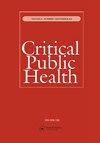How pharmaceutical companies misappropriate fat acceptance
IF 2.3
3区 医学
Q2 PUBLIC, ENVIRONMENTAL & OCCUPATIONAL HEALTH
引用次数: 0
Abstract
ABSTRACTPharmaceutical companies influence whether we perceive conditions as relevant to the medical sector and in need of pharmaceutical intervention (pharmaceuticalization). Recently, through coordinated media and professional campaigns, pharmaceutical companies are coming to influence our understanding of bodily size. Beyond merely affecting conversations about how weight should be understood and engaged with in healthcare, however, pharmaceutical companies are swaying how society approaches weight stigma. By elevating certain voices, those of organizations and clinicians with whom they partner, and not others, including fat acceptance activists, pharmaceutical companies are having a regressive impact on body acceptance veiled as “obesity” stigma advocacy.KEYWORDS: Obesityweight lossconflicts of intereststigmapharmaceuticalizationmedicalization Disclosure statementNo potential conflict of interest was reported by the author(s).Notes1. Fat and higher-weight are used throughout this manuscript non-pejoratively as neutral descriptors; obese/obesity (BMI ≥ 30) are presented in quotes to emphasize the contested nature of the pathologization of fatness (Meadows & Daníelsdóttir, Citation2016).Additional informationFundingThe author(s) reported there is no funding associated with the work featured in this article.制药公司如何滥用脂肪接受度
制药公司影响着我们是否认为条件与医疗部门相关,是否需要药物干预(制药化)。最近,通过协调媒体和专业活动,制药公司开始影响我们对身体尺寸的理解。然而,制药公司不仅影响了关于如何理解和参与医疗保健中的体重问题的讨论,还影响了社会对体重污名的看法。制药公司通过提升某些声音,那些与他们合作的组织和临床医生的声音,而不是其他人的声音,包括接受肥胖的活动家,正在以“肥胖”的耻辱宣传为幌子,对身体的接受产生倒退的影响。关键词:肥胖、减肥、利益冲突、药物化、医疗化披露声明作者未报告潜在利益冲突。Fat和higher-weight在整个手稿中被用作中性描述词,没有贬义;肥胖/肥胖(BMI≥30)以引号表示,以强调肥胖病理化的争议性(Meadows & Daníelsdóttir, Citation2016)。其他信息资金作者报告没有与本文所述工作相关的资金。
本文章由计算机程序翻译,如有差异,请以英文原文为准。
求助全文
约1分钟内获得全文
求助全文
来源期刊

Critical Public Health
Multiple-
CiteScore
5.90
自引率
7.10%
发文量
36
期刊介绍:
Critical Public Health (CPH) is a respected peer-review journal for researchers and practitioners working in public health, health promotion and related fields. It brings together international scholarship to provide critical analyses of theory and practice, reviews of literature and explorations of new ways of working. The journal publishes high quality work that is open and critical in perspective and which reports on current research and debates in the field. CPH encourages an interdisciplinary focus and features innovative analyses. It is committed to exploring and debating issues of equity and social justice; in particular, issues of sexism, racism and other forms of oppression.
 求助内容:
求助内容: 应助结果提醒方式:
应助结果提醒方式:


